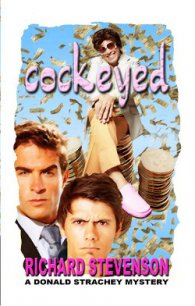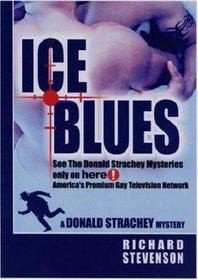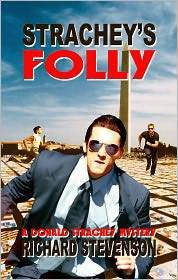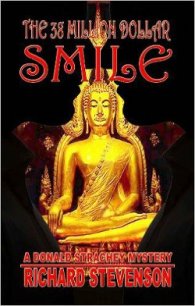A Shock to the System - Stevenson Richard (читать книги онлайн без регистрации TXT) 📗
through Christian religious-supply catalogs. Would you like to see it?"
"We could demonstrate how it's used," Moody said, "if you'd be interested for your survey."
My impulse was to dive through a window. But that might have been seen as overreacting, so I said, "The device sounds interesting, but I'd like to know more about the group therapy sessions. It must have been difficult having men in the group who resisted treatment at one level or another, unlike you eager beavers."
"I can tell you it was a real bitch," Moody said. "You just felt like you were surrounded by traitors."
I said, "That wasn't true for the first eight months, was it? I thought Larry and Paul pretty much observed the spirit of the occasion until they decided to leave. And that all happened in just one session last fall."
"Oh, I'm sure that's what Miss La-di-da Larry would have you believe," Moody said. "That they were such angels. Well, my dear, I can assure you that they were not."
"Dr. Crockwell was there to help us with our sexual dysfunctions," Stover said, panting and jabbing his finger. "And Paul and Larry were always bringing all kinds of problems that had nothing to do with deviancy—drinking and drugs and money problems and stuff like that. As for those, we were there to discuss just one topic," Stover said, brandishing a finger.
And I knew by then what that was. I said, "Who had the alcohol and drug problem?"
"Paul was an alcoholic and Larry was a druggie," Moody said. "They were always dishing and criticizing each other, and one thing I hold against Dr. Crockwell is, he let them go on like that too much. We weren't there to deal with topics like that, and we didn't need to hear it. Like Roland says, we'd paid our money to talk about one thing."
"But wouldn't you say that drugs and alcohol are a common way for men unhappy with their sexuality to cope with it, or avoid coping with it? It's often part of the picture that has to be addressed."
"'But not always bickering the way those two did," Moody said. "Take it to AA or NA, Grace, or keep it on the street."
"I'd heard Paul was an alcoholic," I said, "but I wasn't aware of Larry's drug problem. What kind of drugs did he do?"
Stover looked blank, but Moody's recall on the subject was instant. "He was into both Ecstasy and acid, I know. They had a real catfight over it right in the group one time, and Paul accused Larry of spending money that he needed for his business on drugs. Of course, Paul was the one who was always in trouble over money, and Larry reminded him of it and told him to just butt out."
"It didn't surprise me one bit," Stover said, "when I heard that Paul ended up dead in the gutter. Since he had turned his back on righteousness, it was the best thing he could do for himself."
I said, "Paul may not have killed himself. He may have been murdered. The police are looking into the possibility."
Neither of them reacted dramatically to this news. Moody pursed his lips and got a quizzical look, and Stover just kept looking hard and mean and unaffected by the fate of a man he didn't approve of.
"Who do they think did it?" Moody finally said.
"They don't know. Who can you think of who might have had a reason to kill Paul? Or hated him enough to want to?"
"It was probably queer-boy Bierly," Stover said. Moody pondered this briefly and then nodded.
"Why do you think Larry would kill Paul? They had their disagreements, but they were lovers, after all."
"That's exactly what I mean," Stover snarled. "Homos are unstable people. You keep taking it up the butt, sooner or later you'll crack. It happens all the time. Don't you watch Pat Robertson?"
I said I'd only tuned in briefly. "What about Dr. Crockwell?" I asked. "He's a suspect in the eyes of some. And he was certainly upset with Paul for leaving the group."
"Oh, Mary! Gimme a break, puh-leeze!" Moody squealed.
"Who's going around saying such a thing?" Stover roared. "The
idea of slandering a man of Dr. CrockwelFs standing in the community is character assassination."
I said, "Crockwell doesn't have an alibi, either. On the Thursday night Paul Haig died, Dr. Crockwell was alone in his office until after midnight, he says. Interestingly, the same is true for last Thursday night, when someone shot Larry Bierly in the Millpond Mall parking lot."
They both got an I-smell-a-rat look. "Then maybe it was one of Dr. Crockwell's patients or former patients," Moody said, "and they were trying to pin something on him. Everybody who ever went to him knew Dr. Crockwell worked all by himself in his office on Thursday night. It's when you could call there and he'd answer the phone at night instead of you getting his answering machine."
"Is there anyone in the group who might have wanted to do that?" I asked. "I mean, set Crockwell up?"
"Dr. Crockwell was a beloved guy figure to all of us," Stover harrumphed. "He was a role model and a pal. Except to Larry and Paul, of course, those Judases who betrayed us all."
"Anyway," Moody said, "Dr. Crockwell had three other groups going all the time, ten homos in a group. And if you count people from other years, hundreds of ex-gays must know about his Thursday-night routine."
With a sinking feeling, I said, "I guess that would be true. Is either of you acquainted with a man by the name of Steven St. James?"
Moody shook his head, and Stover said, "No, is he a saint?"
I said I didn't know for sure, but I doubted it.
18
On Sunday morning, cool and rainy, Timmy had gone out and come back with bagels and the Times, and the kitchen was an aromatic Malabar Coast as he prepared his masala tea. Perhaps on that day in Visakhapatnam, twenty-six years after Timmy's Peace Corps leave-taking, an American ritual he had left behind was being reenacted similarly—a middle-aged Indian was sitting and picking the lint off his socks or whatever. I preferred what Timmy had brought home to what I imagined he had left behind. But my imagination in these matters was limited, as I was reminded whenever Timmy's Peace Corps crowd got together and conversed in the patois of their exotic youth with its references to chicken sexing and blood meal, and place names that sounded like long, quick combinations of vowels, consonants and simmering lentils.
I got on the phone. I reached my Department of Motor Vehicles contact at home. He called back three minutes later and, having spoken with a member of the weekend crew keeping an eye on the department's computer system, informed me that the two cars in Lord Chatterley's driveway, the Caddy and the Continental, were registered to Mr. Emil Provost, of that address in Schuylers Landing. The name rang no bell, but why would it?
I couldn't think of anybody I knew in Schuylers Landing, so I called a friend who worked for the New York State Historical Society and asked her about a member of the landed gentry in Schuylers Landing named Emil Provost. She had never heard of him, but she knew who to call downriver. Ten minutes later I had
been informed that: Emil Provost was the surviving patriarch of an old Hudson River family that had made a lot of early money in canal shipping and later money in railroads; Provost and his wife, Ina, had two daughters and a son, all living in Greene County and involved in banking and real estate; both Emil and Ina Provost were patrons of worthy causes, she historical preservation, he naturalist organizations. He was also part-owner of the Hudson Valley Game Farm, I was told, and I thought: "farm." Steven St. James had not been at home on Saturday because "the farm is open now."




